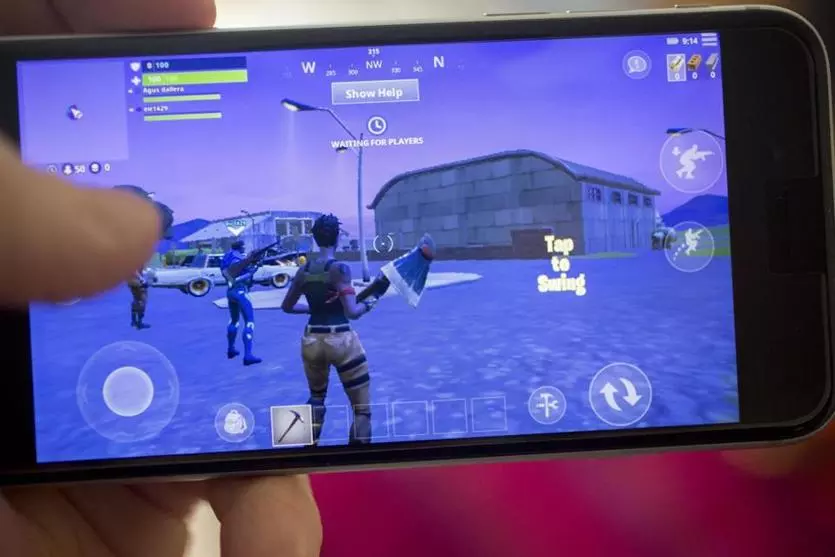Waldorf News
Fortnite may be a virtual game, but it’s having real-life, dangerous effects

By Beth Teitell
“They are not sleeping. They are not going to school. They are dropping out of social activities. A lot of kids have stopped playing sports so they can do this.”
Michael Rich, a pediatrician and director of the Clinic for Interactive Media and Internet Disorders at Boston Children’s Hospital, was talking about the impact “Fortnite: Battle Royale” — a cartoonish multiplayer shooter game — is having on kids, mainly boys, some still in grade school.
“We have one kid who destroyed the family car because he thought his parents had locked his device inside,” Rich said. “He took a hammer to the windshield.”
A year and a half since the game’s release, Rich’s account is just one of many that describe an obsession so intense that kids are seeing doctors and therapists to break the game’s grip, in some cases losing so much weight — because they refuse to stop playing to eat — that doctors initially think they’re wasting away from a physical disease.
The stress on families has become so severe that parents are going to couples’ counselors, fighting over who’s to blame for allowing “Fortnite” into the house in the first place and how to rein in a situation that’s grown out of control.
“One of the parents will get to the point of almost considering a divorce,” said Rich Domenico, a therapist with LiveWell Therapy Associates, in the Back Bay. “It’s similar to working with parents who have a child addicted to drugs.”
Parents worrying about kids spending too much time playing video games isn’t new. But a few significant factors have combined to make today’s games harder to stop playing. Better technology has made the games more interactive, more engaging, and more artistic, said Douglas Gentile, an Iowa State University psychology professor and coauthor of the book “Violent Video Game Effects on Children and Adolescents.” More insidious, game makers have taken a lesson from slot-machine designers and started employing a variable reward schedule, according to Ofir Turel, a professor of Information Systems and Decision Sciences at California State University Fullerton.
In the case of “Fortnite,” the psychological manipulation combines with the game’s flashy colors, its many potential plots, and the element of social interaction to stimulate the brain and train it to “crave” more, he e-mailed the Globe.
“Kids are especially vulnerable to this ‘variable-reward’ mechanism because their brains are still imbalanced,” he explained. “They have almost fully developed reward processing brain systems but their self-control systems are not yet fully developed.”
“Fortnite” has been likened to a cross between “Minecraft” and “The Hunger Games.” Some 200 million people have played, but if you’re not one of them, here’s how it works: One hundred competitors are dropped on an island, where they run around finding weapons and materials to build walls, ramps, and floors that can protect them from other players.

“Fortnite” is a multiplayer game of survival that has been called a cross between “Minecraft” and “The Hunger Games.”
Photo: Andrew Harrar, Bloomberg News
As the game progresses, the game field gets smaller, putting opponents in ever closer range. The last player — or players, if friends are playing as a team — wins.
“Fortnite” is free, but more than 68 percent of players make in-game purchases — like pickaxes, dance moves, and outfits to personalize their characters — and the average player who makes purchases has spent $84.67, according to a 2018 study by the financial services firm Lendedu.
Epic Games Inc., creator of “Fortnite,” did not respond to Globe e-mails.
As “Fortnite” scare stories proliferate — a British behavioral specialist likened it to heroin — many parents wonder if any child can get sucked in.
Rich, of Boston Children’s Hospital, said his clinic has yet to see a patient struggling with “Fortnite” who does not also have an underlying issue. “In fact, we are currently characterizing PIMU” — Problematic Interactive Media Use — “not as a diagnosis, but as a syndrome, a group of symptoms of diagnoses ranging from ADHD to anxiety, depression, or mood disorders that manifest themselves in the interactive media environment.”
One of the BCH clinic’s patients is a Brookline boy who secretly used his father’s credit cards to make thousands of dollars of in-game purchases.
“My sweet mama’s boy became angry and disrespectful,” said the boy’s mother, who spoke to the Globe on condition of anonymity to protect her family’s privacy.
The personality transformation came after the boy switched from a Brookline public school to a private school in sixth grade. A lonely new kid, he eventually managed to make friends through his growing prowess in “Fortnite.”
As the game’s pull escalated, he refused to do anything but play. He wouldn’t go outside. Wouldn’t go to sleepaway camp. Didn’t even want to go out for his own birthday dinner.
“We couldn’t get him to do activities,” his mother said. “It was a constant argument.”
Gaming can lead to weight gain, as kids spend hours sitting on the couch. But Tara McCarthy, a clinical nutritionist with Boston Children’s Hospital, is seeing boys who won’t take a moment away from “Fortnite” to eat.
In each case, the patients came to her after a doctor found unexpected weight loss and, concerned, ordered follow-up evaluations.
McCarthy interviewed the patients, and after hearing descriptions of long stretches with no food intake, she made her diagnosis: “Fortnite.”
Lynne Karlson, a general pediatrician at Floating Hospital for Children at Tufts Medical Center, who has heard about kids denied “Fortnite” kicking down doors, suggests parents limit playtime “before it becomes so all-encompassing.”
But that can be harder than it sounds.
Samuel Roth, a clinical psychologist in Newton, described a scenario that will sound familiar to many parents.
“The parents make a deal with the kids,” he said. “ ‘You can play for this long,’ and the kids are agreeable — they’re eager to start playing.
“Everyone nods their heads, and everyone feels good, until it come to the end of the playing time, and the child cannot abide by the agreement, and the parents feel immensely violated. It tears at the fabric of trust in the family.”
As for the Brookline boy who stole his dad’s credit cards to fund his gaming, he hit rock bottom on a family trip to New Hampshire, in the summer of 2018, when he refused to go boating. While the rest of the group was enjoying the lake, he tried to break into the family car with a hammer to get his electronic device.
The incident lead to an 11-day inpatient hospital stay, where he got therapy and quit “Fortnite” cold turkey.
Looking back, even he is baffled by the power the game held. “It’s hard for me to understand why I got to the point where I was playing it so much and what I’d do to be able to play,” he said.
Now, at 13, on the other side of “Fortnite,” he’s disturbed by what he sees around him. “The little kids on the school bus have gone from Pokeman cards to ‘Fortnite,’ ” he said. “They’re in third and fourth grades and that’s all they talk about.”
From the Boston Globe
 Transforming Voices Worldwide
Transforming Voices Worldwide Waldorf-inspired Homeschool Curriculum
Waldorf-inspired Homeschool Curriculum Quality Education in the Heartland
Quality Education in the Heartland
 Waldorf Training in Australia
Waldorf Training in Australia Everything a Teacher Needs
Everything a Teacher Needs Middle School Science With Roberto Trostli
Middle School Science With Roberto Trostli Bringing Love to Learning for a Lifetime
Bringing Love to Learning for a Lifetime The Journey is Everything
The Journey is Everything Immersive Academics and Arts
Immersive Academics and Arts Summer Programs - Culminating Class Trips
Summer Programs - Culminating Class Trips Space speaks. Its language is movement.
Space speaks. Its language is movement. Association for a Healing Education
Association for a Healing Education Train to Teach in Seattle
Train to Teach in Seattle ~ Ensoul Your World With Color ~
~ Ensoul Your World With Color ~ Caring for All Stages of Life
Caring for All Stages of Life Apply Today: New Cohort Starts Nov. 2025
Apply Today: New Cohort Starts Nov. 2025 Flexible preparation for your new grade
Flexible preparation for your new grade Bay Area Teacher Training
Bay Area Teacher Training Jamie York Books, Resources, Workshops
Jamie York Books, Resources, Workshops Roadmap to Literacy Books & Courses
Roadmap to Literacy Books & Courses Great books for Waldorf Teachers & Families
Great books for Waldorf Teachers & Families Full-Time Teacher Education
Full-Time Teacher Education RSS Feeds
RSS Feeds